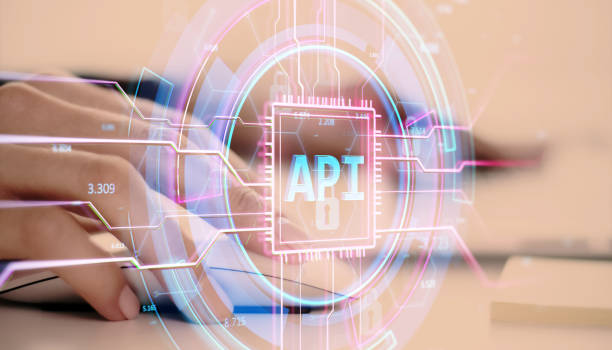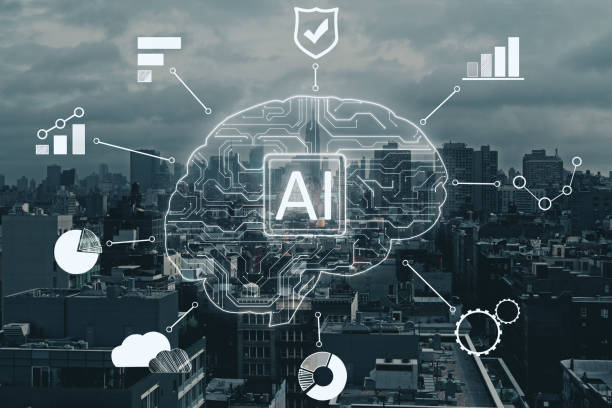What is Artificial Intelligence and How Does it Work?

#Artificial_Intelligence (AI) refers to the ability of a computer system to mimic human cognitive functions such as learning, problem-solving, and decision-making.
Unlike traditional programming where instructions are explicitly defined, AI uses algorithms and statistical models to learn from data and perform specific tasks.
Simply put, AI strives to enable computers to perform tasks that typically require human intelligence.
AI is classified into two main categories: weak or narrow AI, and strong or general AI.
Weak AI is designed to perform a specific task, such as facial recognition or filtering spam emails.
This type of AI is currently used in many applications.
In contrast, strong AI has the ability to understand, learn, and apply knowledge across a wide range of tasks, just like humans.
Strong AI is still in the developmental stages, and achieving it is a major challenge.
Machine learning algorithms are the beating heart of AI.
These algorithms allow computers to learn from data without explicit programming.
There are two main types of machine learning: supervised learning, where the algorithm is trained using labeled data, and unsupervised learning, where the algorithm finds patterns in unlabeled data.
Reinforcement learning is another type of machine learning where an agent learns to optimize a specific goal by taking actions in an environment and receiving rewards.
AI is rapidly advancing and has the potential to transform industries and various aspects of our lives.
From self-driving cars to medical diagnosis and online recommendation systems, AI currently plays a significant role in many fields.
However, the development of AI also comes with important challenges and ethical considerations that require careful and responsible examination.
Did you know your company’s website is the first point of contact for 75% of potential customers?
Your website is the face of your brand. With **Rasaweb** corporate website design services, build an online presence that earns customer trust.
✅ Create a professional and lasting image for your brand
✅ Attract target customers and increase online credibility
⚡ Get free consultation from **Rasaweb** experts!
Practical Applications of Artificial Intelligence in Everyday Life

Artificial intelligence is no longer a science fiction concept; it is increasingly integrated into our daily lives.
From virtual assistants like Siri and Alexa to movie recommendation systems on Netflix, AI is subtly shaping our experiences.
One of the most prominent applications of AI is in facial recognition.
This technology is used in smartphones, security cameras, and access control systems.
AI can recognize faces with high accuracy, enabling the identification of individuals and the provision of personalized services.
Facial_Recognition
In the medical field, AI assists doctors in diagnosing diseases, planning treatments, and developing new drugs.
AI algorithms can analyze medical images such as MRI and CT scans and detect abnormalities with high accuracy.
Additionally, AI plays a crucial role in the discovery of new drugs and the development of personalized treatments.
The transportation industry has also been significantly impacted by AI.
Self-driving cars use sensors and AI algorithms to understand their surroundings and drive without human intervention.
This technology has the potential to reduce accidents, improve traffic, and increase access to transportation.
Furthermore, AI has extensive applications in many other industries such as retail, finance, manufacturing, and education.
From customer service chatbots to financial risk management systems and personalized learning platforms, AI is changing how organizations operate and provide services to customers.
AI is essentially the intelligent automation of processes.
Machine Learning and Key Algorithm Types

Machine learning is a subset of artificial intelligence that focuses on developing systems that can learn from data.
Instead of explicit programming, machine learning algorithms identify patterns in data and use these patterns to make predictions or decisions.
There are three main types of machine learning: supervised learning, unsupervised learning, and reinforcement learning.
Supervised learning uses labeled data to train a model.
Labeled data includes inputs and desired outputs.
For example, a supervised learning model can be trained using labeled images of cats and dogs to distinguish between the two animals.
Supervised_Learning
Unsupervised learning uses unlabeled data to discover patterns and structures.
For example, an unsupervised learning model can be used to cluster customers based on their purchasing behavior or to reduce data dimensionality.
Unsupervised_Learning
Reinforcement learning involves an agent learning to optimize a specific goal by taking actions in an environment and receiving rewards.
For example, a reinforcement learning agent can learn to play a game or control a robot.
Some key machine learning algorithms include:
- Linear Regression
- Logistic Regression
- Decision Trees
- Support Vector Machines
- Neural Networks
- Clustering Algorithms (such as K-means)
The choice of the appropriate algorithm depends on the type of data and the problem to be solved.
| Algorithm | Learning Type | Application |
|---|---|---|
| Linear Regression | Supervised | Predicting continuous values |
| Logistic Regression | Supervised | Classification |
| Support Vector Machine | Supervised | Classification, Regression |
Deep Neural Networks and Their Role in Artificial Intelligence

Deep Neural Networks (DNNs) are a type of artificial neural network with multiple hidden layers.
These layers allow deep neural networks to learn more complex patterns in data.
Deep neural networks have significantly improved AI performance in many areas and play a crucial role in recent advancements in AI.
Deep_Neural_Networks
Deep neural networks consist of multiple layers of interconnected nodes, known as artificial neurons.
Each neuron receives inputs from neurons in the previous layer, applies an activation function, and sends the output to neurons in the next layer.
By training the network with large amounts of data, the weights of the connections between neurons are adjusted so that the network can learn the desired patterns.
Deep neural networks are used in a wide range of applications, including:
- Image and video recognition
- Speech recognition
- Natural Language Processing
- Gaming
- Self-driving cars
For example, deep neural networks in image recognition can detect objects, faces, and scenes with high accuracy.
In speech recognition, deep neural networks can convert human speech into text.
In natural language processing, deep neural networks can understand and generate text.
One of the main challenges of deep neural networks is the need for large amounts of data and high computational power for training.
However, with recent advancements in hardware and algorithms, training more complex deep neural networks has become increasingly feasible.
Artificial intelligence can facilitate many tasks in the near future
Do you dream of a thriving online store but don’t know where to start?
Rasaweb is your comprehensive e-commerce website design solution.
✅ Attractive and user-friendly design
✅ Increase sales and revenue⚡ Get free consultation
Natural Language Processing (NLP) and its Applications

Natural Language Processing (NLP) is a branch of artificial intelligence that deals with the interaction between computers and human languages.
The goal of NLP is to enable computers to understand, interpret, and generate human language.
NLP plays a significant role in many AI applications, including:
- Machine translation
- Sentiment analysis
- Chatbots
- Text summarization
- Speech recognition
Machine translation automatically translates text from one language to another.
Sentiment analysis identifies emotions and attitudes expressed in text.
Chatbots interact with users in natural language.
Text summarization generates a concise summary of a long document.
Speech recognition converts human speech into text.
NLP uses various techniques, including machine learning, statistics, and linguistics, to process human language.
Some common NLP techniques include:
- Tokenization
- Stemming
- Lemmatization
- Part-of-Speech Tagging
- Named Entity Recognition
With recent advancements in deep learning, NLP has significantly improved.
Large language models, such as Transformers, are capable of understanding and generating human language with unprecedented accuracy.
These models are used in a wide range of NLP tasks, including machine translation, text summarization, and text generation.
NLP is currently used in many industries, including customer service, marketing, finance, and healthcare.
Ethical Considerations and Challenges Facing Artificial Intelligence

The development of artificial intelligence comes with important challenges and ethical considerations.
As AI advances, concerns have grown regarding its impact on jobs, privacy, discrimination, and security.
These considerations must be seriously examined to ensure that AI is used for the benefit of society.
One of the most significant concerns is the impact of AI on employment.
With the automation of many tasks by AI, many jobs may be lost.
Governments and organizations must invest in training and preparing the workforce for new jobs created by AI.
Another concern is privacy.
AI systems often require large amounts of data to learn and operate.
This data may include sensitive personal information.
Strict laws and regulations must be in place to protect individuals’ privacy from data misuse.
Discrimination is another significant concern.
AI algorithms may inadvertently be discriminatory if trained with biased data.
Algorithms must be carefully reviewed to ensure their fairness and lack of discrimination.
AI_Ethics_and_Discrimination
Security is also an important concern.
AI systems may be attacked and used for malicious purposes.
Strong security measures must be in place to protect AI systems from cyberattacks.
Furthermore, there are important philosophical questions about the nature of consciousness and the rights of machines.
If AI reaches a level of intelligence similar to humans, should it be granted rights?
To address these challenges and ethical considerations, a responsible and thoughtful approach to the development and use of artificial intelligence must be adopted.
This approach should include collaboration among governments, organizations, researchers, and the general public.
The Future of Artificial Intelligence and its Impact on Society

Artificial intelligence is rapidly advancing and is expected to have a profound impact on society in the future.
AI is projected to change many aspects of our lives, from how we work and interact with each other to how we treat diseases and solve global problems.
In the realm of employment, AI may lead to the automation of many tasks and the elimination of some jobs.
However, AI also creates new opportunities for job creation and increased productivity.
AI_and_Employment
In healthcare, AI can assist doctors in diagnosing diseases, planning treatments, and developing new drugs.
AI can also be used to provide personalized healthcare and improve access to health and medical services.
In education, AI can be used to create personalized learning platforms and provide feedback to students.
AI can also be used to automate administrative tasks and reduce teachers’ workload.
In transportation, self-driving cars can reduce accidents, improve traffic, and increase access to transportation.
However, the development of AI also comes with challenges and risks.
These risks must be seriously examined to ensure that AI is used for the benefit of society.
| Area | Potential Impacts of AI |
|---|---|
| Employment | Automation of tasks, creation of new jobs, increased productivity |
| Healthcare | Disease diagnosis, treatment planning, drug development |
| Education | Personalized learning platforms, task automation |
How Artificial Intelligence Can Transform Your Business?

Artificial intelligence has the potential to transform businesses of all sizes and in every industry.
From automating repetitive tasks to providing valuable insights from data, AI can help businesses become more efficient, profitable, and competitive.
Some of the ways AI can transform your business include:
- Improved Customer Service: AI chatbots can answer customer questions, resolve issues, and provide 24/7 support.
This can lead to increased customer satisfaction and reduced customer service costs. - Increased Sales and Marketing: AI can be used to analyze customer data, identify patterns, and predict customer behavior.
This can help businesses create more targeted marketing campaigns, personalize their products and services, and increase sales. - Improved Operational Efficiency: AI can be used to automate repetitive tasks, optimize processes, and reduce costs.
This can lead to increased productivity, reduced errors, and improved profitability. - Risk Reduction: AI can be used to identify and prevent fraud, monitor cybersecurity, and manage risk.
To successfully implement AI in your business, you need a clear strategy and high-quality data.
It is also necessary to collaborate with AI experts and foster a culture of learning and innovation within your organization.
By strategically using AI, businesses can gain a significant competitive advantage and achieve their goals.
Are you tired of losing business opportunities due to not having a professional corporate website?
Rasaweb helps you with professional corporate website design to:
✅ Build a powerful and reliable image for your brand
✅ Convert website visitors into loyal customers
⚡ Get a free consultation now!
Popular AI Tools and Platforms for Developers

Developers can use a wide range of AI tools and platforms to create and deploy AI applications.
These tools and platforms include:
- Machine Learning Frameworks: Frameworks like TensorFlow, PyTorch, and scikit-learn provide tools for building, training, and deploying machine learning models.
- Cloud AI Services: Cloud services such as Amazon AWS, Google Cloud AI, and Microsoft Azure AI offer AI tools as a service.
These services include APIs for image recognition, speech recognition, natural language processing, and other AI tasks. - Software Development Kits (SDKs): SDKs are collections of tools and libraries that help developers access AI APIs and easily create AI applications.
- No-code/Low-code Platforms: These platforms allow non-technical users to create AI applications without needing programming knowledge.
The choice of the right tool and platform depends on the specific project needs.
Factors to consider include:
- Type of AI tasks
- Amount of available data
- Developer skills
- Budget
By using the right tools and platforms, developers can quickly and easily create and deploy AI applications.
Artificial intelligence has greatly assisted programmers in coding.
Learning Resources and AI Learning Path

If you are interested in learning artificial intelligence, many educational resources are available to you.
These resources include:
- Online Courses: Platforms like Coursera, edX, and Udacity offer various online courses in AI and machine learning.
- Books: Many books on AI and machine learning can help you learn the principles and techniques of these fields.
- Research Papers: Research papers cover the latest advancements in AI.
- Online Communities: Online communities like Stack Overflow and Reddit can help you find answers to your questions and connect with other AI enthusiasts.
A suggested learning path for artificial intelligence includes:
- Learning the fundamentals of mathematics and statistics
- Learning programming languages like Python
- Learning the principles of machine learning
- Familiarizing yourself with machine learning frameworks like TensorFlow and PyTorch
- Working on practical projects
With effort and perseverance, you can acquire the knowledge and skills necessary to enter the exciting world of artificial intelligence.
Artificial intelligence continues to advance, and learning it is very important for the future.
Frequently Asked Questions
| Question | Answer |
|---|---|
| What is artificial intelligence? | It is the simulation of human intelligence in machines programmed to think like humans and mimic their actions. |
| What are the main branches of AI? | They include machine learning, deep learning, natural language processing, computer vision, and robotics. |
| What is Machine Learning? | It is a branch of artificial intelligence focused on enabling systems to learn from data and identify patterns without explicit programming. |
| Mention examples of AI applications in our daily lives. | Voice assistants (like Siri and Alexa), recommendation systems in Netflix and Amazon, self-driving cars, and facial recognition programs. |
| What is Deep Learning? | It is a subset of machine learning that uses multi-layered (deep) artificial neural networks to process large amounts of data. |
| What is Natural Language Processing (NLP)? | It is a branch of artificial intelligence focused on enabling computers to understand, interpret, and generate human language. |
| What are some ethical concerns related to AI? | They include data bias, privacy, job displacement, and accountability in case of errors. |
| What are the main benefits of AI? | Increased efficiency, improved decision-making, automation of repetitive tasks, and discovery of complex patterns in data. |
| How is AI used in healthcare? | In disease diagnosis, drug discovery, medical image analysis, and personalized patient care. |
| How do you see the future of AI? | It is expected to continue evolving rapidly, affecting all aspects of human life, from industry to education and entertainment. |
And other services of Rasa Web Advertising Agency in the field of advertising
- Smart Sales Automation: Transform online growth with the help of intelligent data analysis.
- Smart Customer Journey Map: Designed for businesses seeking to analyze customer behavior through attractive UI design.
- Smart Google Ads: Designed for businesses looking to increase click-through rates by optimizing key pages.
- Smart Marketplace: A novel service to increase online growth through the use of real data.
- Smart Sales Automation: A fast and efficient solution for analyzing customer behavior with a focus on precise audience targeting.
And hundreds of other services in the field of internet advertising, advertising consultation, and organizational solutions.
Internet Advertising | Advertising Strategy | Advertorial
Resources
What is Artificial Intelligence?Applications of Artificial IntelligenceLatest AI NewsAI Revolution
? With Rasaweb Afarin, transform your business in the digital world. From secure and professional website design to SEO and targeted content marketing, we offer comprehensive solutions for your success.
📍 Tehran, Mirdamad Street, next to Bank Markazi, Southern Kazeroon Alley, Ramin Alley, No. 6


